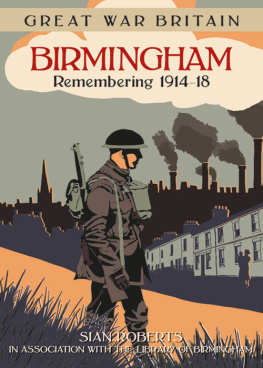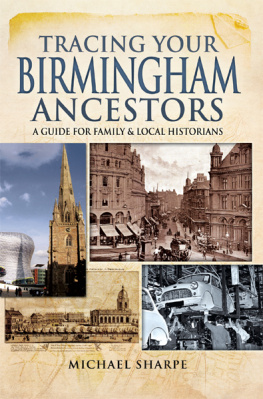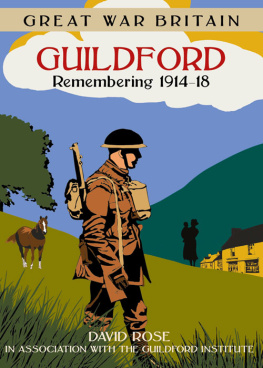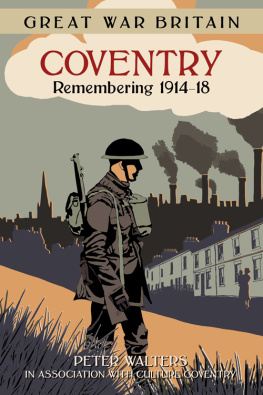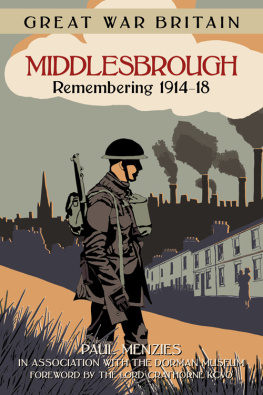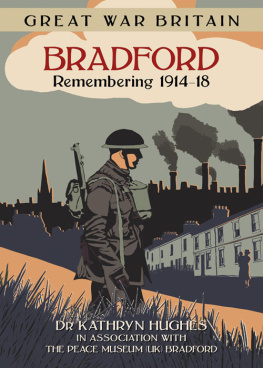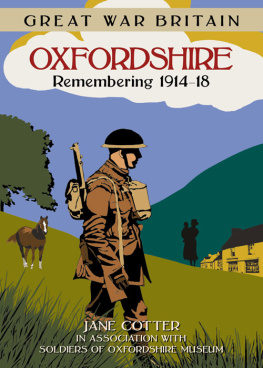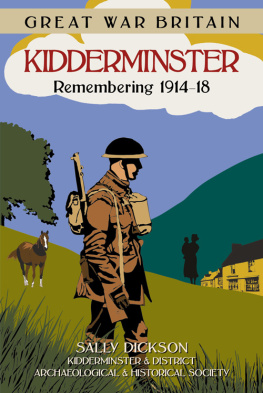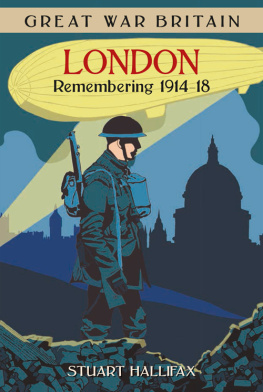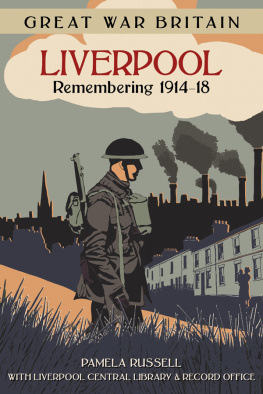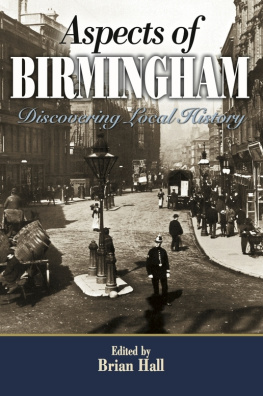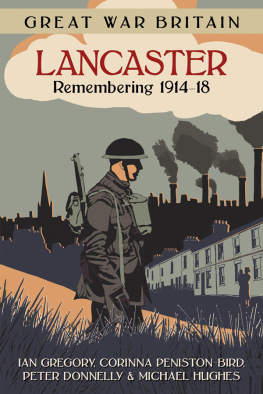
This book is dedicated to the memory of Pam Gwynfa Williams Birmingham teacher, historian and friend.
C ONTENTS



I would like to thank all my colleagues in the Learning Resources Team of the Library of Birmingham for their help and support, particularly Charlotte Tucker and Kathryn Hall from the Digital Team and Nhia Huynh from the Conservation Team. Grateful thanks are also due to Anne Elliott from the Music Library for the information about music in the period, to Dr Andy Green for his initial research in the newspaper collections, and to Professor Ian Grosvenor with whom I have collaborated on the research into children during the war.
I am grateful to Sarah Foden and the Cadbury Archive, Mondelez International for permission to reproduce the images on pages 35, 110, 140 and 144, and to Jo-Ann Curtis and Birmingham Museums Trust for access to the oral histories at the museum and permission to quote from the interviews. I would also like to thank the Barrow family for their kind permission to reproduce the two illustrations by Joseph Southall.
Sorrow seems on every hand.
Elizabeth Cadbury, August 1916
Do we realise what historic times these are?
Henry Gibbs, January 1919
The two voices above both appear in the First World War archives of the Library of Birmingham. Both represent different experiences of living through the conflict in the city. Elizabeth Cadbury, an affluent and privileged woman of influence, who would later be honoured for her part in the war effort, was writing during the summer of the Somme. The second writer, Henry Gibbs, was a boy just turning 14, reflecting on the advent of peace and the last four and a half years of his childhood a few days before he left school.
The First World War touched the lives of every man, woman and child in Birmingham. All aspects of life were affected from the price of food, to family life and a childs education at school. How an individual experienced the conflict, however, was profoundly coloured by age, gender, social class, nationality, and economic circumstances. A persons religious beliefs or political perspective could radically determine the choices they made or the paths they followed. For some the war brought a chance to expand their horizons: to serve their country, learn new skills or earn higher wages, even if these opportunities were only temporary. For others the war brought permanent change, fracturing their world through death, disability or grief for the loss of loved ones.
This book aims to tell some of the stories of how war was experienced by people in Birmingham, as told through the citys archive collections. It is not intended as a complete history of the city and its people at war as that would be far too large a task for one book. The first history of Birmingham and the war was published by Brazier and Sandford in 1921, and for several aspects of the conflict it remains the standard reference work. With the notable exception of Terry Carters Birmingham Pals , many aspects of Birmingham and the First World War remain largely under researched and untold.
One of the aims of this book, therefore, is to draw attention to the potential riches of the Library of Birminghams archive and local history collections, and encourage people to use them to explore the history of their families or local communities during the conflict. It also hopefully brings to the fore some of the lesser-known aspects of Birmingham at war, such as the experience of children, the tensions and issues faced by families, and the real dilemmas faced by individuals as they responded to circumstances that are hard for us, a century later, to comprehend.
All the images, and the vast majority of the quotations from archives used in this book, come from the collections of the Library of Birmingham unless stated otherwise. Document reference numbers are given in the endnotes to each chapter, and the original spelling and punctuation has been retained when quoting from archive sources.
Sian Roberts, Collection Curator,
Library of Birmingham, 2014
Endnotes
MS 466/1/1/15/3/13; The Cradle , January 1919.
Birmingham at the outbreak of war was a leading city of the British Empire, where huge wealth and opportunity sat side by side with extreme poverty and hardship. It had grown dramatically from the small town of the eighteenth century to a manufacturing and industrial powerhouse, and the major employers Cadbury, Dunlop, Nettlefold and Austin employed thousands of workers. Granted city status in 1889, it was then expanded considerably by the Greater Birmingham Act of 1911 which almost trebled the citys geographical area and brought Aston Manor, Erdington, Handsworth, Yardley and most of Kings Norton and Northfield within the city boundary. A month before war was declared, on 2 July 1914, the citys best-known politician and elder statesman, Joseph Chamberlain, died and was buried at Key Hill Cemetery.
Even before the war began, the impact of European uncertainty was felt in Birmingham. The end of July and first few days of August 1914 saw a significant rise in the cost of living as food prices rocketed. On Saturday, 31 July the price of butter, bacon and sugar went up alarmingly. By the end of the first week of war, the price of sugar had increased from two and a half pence a pound to between five and six pence, and bacon from between ten pence and one shilling per pound to over a shilling and two pence a pound. Some of the immediate wartime measures made the situation worse, the military requisitioning of forty-five of the Co-operative Societys horses, for example, meant that routine food deliveries were impossible.

Playbill from the Gaiety Theatre advertising a war news film, August 1914. (Theatre Playbills Collection)
The hike in prices was accompanied by a depression in trade. Contracts and orders were cancelled or put on hold due to uncertainty about the situation. Countless people were made unemployed or put on short time which dramatically affected their pay. Firms such as Tangye, Metropolitan Waggon Works and many of the jewellery firms made drastic reductions to the working week, down to half time in many cases. William Henry Norton worked in the stores department at Veritys Plume and Victoria Works in Aston. On 7 August he received a letter from the firm:
Owing to the war an immediate reduction in expenses is necessitated. Able-bodied unmarried men will not be required, as such can go to the Front and fight for their Country and homes, while the services of most of the lady members of the staff will be dispensed with temporarily; others will be put on reduced pay. In your case your salary will be reduced by 50% as from Monday, August 17th. If the war continues further reductions may be necessary.
The local labour exchange dealt with double the normal rates of unemployment. In July 1914 there were 2,600 men and 600 women registered as unemployed. By the end of August this had increased to 6,200 men and 1,700 women. Male unemployment reduced during September and there were fewer than 4,000 men registered by the end of the month. In contrast the number of unemployed women increased to 1,766. Although the problems were short term and industry and employment would see a recovery very soon, there is no doubt that it caused significant hardship, particularly to the poorest who had no savings on which to fall back and so had to turn to charities for help. The records of the childrens charity Middlemore Emigration Homes illustrate how the outbreak of the war affected the poorest, and those whose circumstances as single or widowed parents exacerbated their difficulties. On 28 September, George Ball, a single father who worked at Brotherton & Co. in Nechells, turned to Middlemore for help when he could no longer maintain his child on his own. His earnings twenty-two shillings a week when in full-time employment had decreased substantially and he was in considerable debt. Similarly, in November, Ellen Elsmore a single mother and hand-press worker reported that her weekly earnings were normally between nine and twelve shillings but for the previous several weeks she had been paid only seven shillings a week and, as her rent alone was three and six, she had fallen into arrears.
Next page
